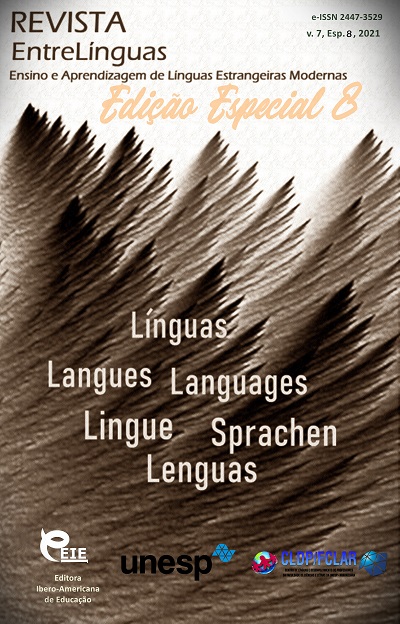Etnicidade e cultura nacional: passado, presente futuro
DOI:
https://doi.org/10.29051/el.v7iesp.8.16347Palavras-chave:
Etnia, Cultura natural, Globalizaçã, Identidade nacional, Memória, Conflitos étnicosResumo
Muitos filósofos contemporâneos, especialmente pós-modernos, enfatizam que a história é uma das práticas representativas pelas quais o sujeito humano é reproduzido. Provavelmente, pode-se argumentar que o passado é um modelo definitivo com o qual, em condições de total incerteza, as perspectivas históricas podem ser traçadas para a consolidação da sociedade. É o passado que pode se tornar um recurso “útil” com o qual o grupo étnico recria sua integridade e - conseqüentemente - seu presente e futuro. , a principal natureza subjetiva do etnocentrismo é enfatizada por muitos pesquisadores. Assim, segundo as interpretações antropológicas, a visão subjetiva (como os problemas nacionais, considerados em sua retrospectiva histórica, são vistos pelos agentes do conflito) pode ser mais importante do que a objetividade da ciência histórica. Na verdade, a desconfiança em metanarrativas históricas está se tornando uma característica integrante das teorias sociais modernas. Isso não significa que defender o subjetivismo como uma característica essencial do etnocentrismo seja a única posição. Será mais correto comparar não nacionalismo e etnocentrismo, mas nacionalismo e etnicidade, como um fundamento profundo do nacionalismo. Assim, nas ciências sociais ocidentais, costuma-se conectar o nacionalismo com a construção da nação, identificando-o com a condição de Estado, enquanto a etnicidade é considerada uma fonte e uma forma de construção da identidade. Ao mesmo tempo, foram desenvolvidas várias abordagens para avaliar a correlação entre etnia e nacionalismo. Portanto, há uma interpretação do nacionalismo como uma espécie de movimento político baseado em uma falsa consciência, que é criada pela etnicidade, mas não pode ser explicada, porque tem raízes mais profundas que residem na economia política, e não na cultura. A memória coletiva apóia a continuidade histórica por meio da rememoração de elementos específicos dos “arquivos da memória histórica”. Isso possibilita uma abordagem analítica da construção discursiva subjetiva da identidade étnica, especialmente no que diz respeito à questão de que tipo de "história nacional" é contada, o que e como é lembrada, e entre quais "eventos" se estabelece uma conexão que se reflete. em representações subjetivas.
Downloads
Referências
BECK, U. The Cosmopolitan Society and Its Enemies. https: // www.researchgate.net/publication/242750059
BOUCHARD, Gérard. National Myths: Constructed Pasts, Contested Presents. https://books.google.com/books?id=D1-4cQC8VtcC&printsec
Calhoun, Craig Nationalism and Ethnicity. http: //www.columbia.edu/itc/sipa/U6800/
Cit.ex: Tina Kempin Reuter. Ethnic Identity, Ethnicity, And Ethnic Group. https://www.britannica.com/topic/ethnic-conflict
ELIADE, M. Myths of the modern world. http://www.aquarun.ru/psih/relig/relig1p1.html
ELLER, JACK DAVID. From Culture to Ethnicity to Conflict: An Anthropological Perspective on Ethnic Conflict. https://books.google.com/books?id
ELLER, JACK DAVID. From Culture to Ethnicity to Conflict: An Anthropological Perspective on Ethnic Conflict. https://books.google.com/books?id
Gizatova, G.K., IVANOVA, O.G. (2015). Myth in Construction of National Identity. Rethinking social action. Core values, 1, 577-581.
GIZATOVA, G.K., IVANOVA, O.G. (2013). Transformation of subjectivity in the modern multicultural society. Bulletin of the Russian nation, 5, 104 -120.
HANNERZ, U. Flows, boundaries and hybrids: Keywords in Transnational Anthropology. http://www.transcomm.ox.ac.uk/working%20papers/hannerz.pdf
Jameson, F. Notes on Globalization as a Philosophical Issue. The Cultures https://doi.org/10.2307/2658665
KOVRIGIN, V. (2015). Understanding the phenomenon of ethnocentrism: modern connotations. Constructive and destructive forms of mythologization of social memory in the past and present, Lipetsk, 399 p.
LERCHE, Charles O. The Conflicts of Globalization. http://www.gmu.edu/programs/icar/ijps/index.htm
MNATSAKYAN, M.O. (2004). Nation and nationalism. Sociology and psychology of national life. - M., UNITY-DANA,. - 367 p. - (Series Cogito ergo sum), 14-15.
ORLOVA, E.A. (2004). Cultural (Social) Anthropology. M.: Academic Project, - 480 p.
WODAK, R., DE CILLIA, R., & REISIGL, M. (1999). The discursive construction of national identities. Discourse and Society, 10(2), 149-173.
Downloads
Publicado
Como Citar
Edição
Seção
Licença

Este trabalho está licenciado sob uma licença Creative Commons Attribution-NonCommercial-ShareAlike 4.0 International License.
Os manuscritos aceitos e publicados são de propriedade da Revista EntreLínguas. Os artigos publicados e as referências citadas na Revista EntreLínguas são de inteira responsabilidade de seus autores.
Transferência de direitos autorais – autorização para publicação
Caso o artigo submetido seja aprovado para publicação, já fica acordado que o(s) autor(es) autoriza(m) a UNESP a reproduzi-lo e publicá-lo na EntreLínguas, entendendo-se os termos “reprodução” e “publicação” conforme definição respectivamente dos incisos VI e I do artigo 5° da Lei 9610/98. O artigo poderá ser acessado pela rede mundial de computadores (Internet), sendo permitidas, a título gratuito, a consulta e a reprodução de exemplar do artigo para uso próprio de quem a consulta, desde que haja a citação ao texto consultado. Essa autorização de publicação 328 EntreLínguas, Araraquara, v. 1, n .2, p. 323-328, jul./dez. 2015 não tem limitação de tempo, ficando a UNESP responsável pela manutenção da identificação do(s) autor(es) do artigo. Os artigos publicados e as referências citadas na Revista EntreLínguas são de inteira responsabilidade de seus autores.











